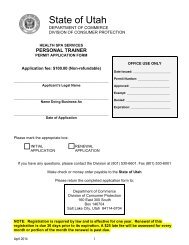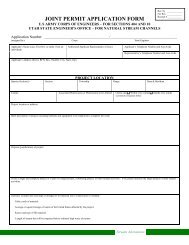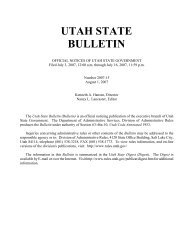Vol. 2010, No. 11 (06/01/2010) PDF - Administrative Rules - Utah.gov
Vol. 2010, No. 11 (06/01/2010) PDF - Administrative Rules - Utah.gov
Vol. 2010, No. 11 (06/01/2010) PDF - Administrative Rules - Utah.gov
Create successful ePaper yourself
Turn your PDF publications into a flip-book with our unique Google optimized e-Paper software.
NOTICES OF PROPOSED RULES DAR File <strong>No</strong>. 33616<br />
substantial rights of a party need not be amended and shall be<br />
disregarded.<br />
(5) Response to a <strong>No</strong>tice of Agency Action.<br />
(a) Formal Adjudicative Proceedings.<br />
In accordance with Subsection 63G-4-2<strong>01</strong>(2)(a)(vi), a<br />
respondent in a formal adjudicative proceeding shall file a response<br />
to the notice of agency action.<br />
(b) Informal Adjudicative Proceedings.<br />
(i) In accordance with Subsection 63G-4-203(1)(a), a<br />
respondent in an informal adjudicative proceeding may file, but is<br />
not required to file except as provided in Subsection (ii), a response<br />
to a notice of agency action.<br />
(ii) The presiding officer may, upon a determination of<br />
good cause, require a person against whom an informal adjudicative<br />
proceeding has been initiated to submit a response by so ordering in<br />
the notice of agency action or the notice of receipt of request for<br />
agency action.<br />
(c) Time Period for Filing a Response.<br />
Unless a different date is established by law, rule, or by<br />
the presiding officer, a response to a notice of agency action or a<br />
notice of receipt of request for agency action shall be filed within 30<br />
days of the mailing date of the notice.<br />
(6) Motions.<br />
(a) General. Any motion that is relevant to an<br />
adjudicative proceeding and is timely may be filed. All motions<br />
shall be filed in writing, unless the necessity for a motion arises at a<br />
hearing and could not have been anticipated prior to the hearing.<br />
Subsection 63G-4-102(4)(b) shall not be construed to prohibit a<br />
presiding officer from granting a timely motion to dismiss for<br />
failure to prosecute, failure to comply with these rules, failure to<br />
establish a claim upon which relief may be granted, or any other<br />
good cause basis.<br />
(b) Time for Filing Motions to Dismiss.<br />
Any motion to dismiss on a ground described in Rule<br />
12(b)(1) through (7) of the <strong>Utah</strong> <strong>Rules</strong> of Civil Procedure shall be<br />
filed prior to filing a responsive pleading if such a pleading is<br />
permitted unless, subject to Subsections R151-46b-5(5)(b) and -9(9)<br />
(c)(ii), the presiding officer allows additional time upon a<br />
determination of good cause.<br />
(c) Memoranda and Affidavits.<br />
The presiding officer shall permit and may require<br />
memoranda and affidavits in support or contravention of a motion.<br />
Unless otherwise <strong>gov</strong>erned by a scheduling order issued by the<br />
presiding officer, any memorandum or affidavits in support of a<br />
motion shall be filed concurrently with the motion, any<br />
memorandum or affidavits in response to a motion shall be filed no<br />
later than ten days after service of the motion, and any final reply<br />
shall be filed no later than five days after service of the response.<br />
(d) Oral Argument.<br />
(i) The presiding officer may permit or require oral<br />
argument on a motion.<br />
(ii) Any oral argument on a motion shall be scheduled to<br />
take place no more than 10 calendar days after the day on which the<br />
final submission on the motion is filed.<br />
(e) Ruling on a motion.<br />
(i) The presiding officer shall verbally rule on a motion at<br />
the conclusion of oral argument whenever possible.<br />
(ii) When a presiding officer verbally rules on a motion,<br />
the presiding officer shall issue a written ruling within 30 calendar<br />
days after the day on which the presiding officer made the verbal<br />
ruling.<br />
(iii) If the presiding officer does not verbally rule on a<br />
motion at the conclusion of oral argument, the presiding officer<br />
shall issue a written ruling on the motion no more than 30 calendar<br />
days after:<br />
(A) oral argument; or<br />
(B) if there was no oral argument, the final submission on<br />
the motion.<br />
(iv) The failure of the presiding officer to comply with<br />
the requirements of this Subsection (6)(e) is not a basis for<br />
dismissal of the matter, and may not be considered an automatic<br />
denial or grant of the motion.<br />
R151-46b-<strong>11</strong>. Orders.<br />
(1) Requirements.<br />
(a) All orders issued by a presiding officer shall comply<br />
with the requirements of Subsection 63G-4-203(1)(i) or Section<br />
63G-4-208, respectively. In the case of default orders and orders<br />
issued subsequent to a default order, the requirements of<br />
Subsections 63G-4-203(1)(i)(iii) and (iv) and 63G-4-208(1)(e),(f)<br />
and (g) are satisfied if the order includes a notice of the right to seek<br />
to set aside the order as provided in Subsection 63G-4-209(3).<br />
(b) Except as provided in Sections 63G-4-502 and<br />
R156-46b-16, as to emergency proceedings, t[T]he presiding officer<br />
shall issue an order within 45 calendar days after the day on which<br />
the hearing concludes.<br />
(c) If the presiding officer permits the filing of any posthearing<br />
documents, that filing shall be scheduled in a way that<br />
allows the presiding officer to issue an order within 45 calendar<br />
days after the day on which the hearing concludes.<br />
(d) The failure of the presiding officer to comply with the<br />
requirements of this Subsection (1) is not a basis for dismissal of the<br />
matter, and may not be considered an automatic denial or grant of<br />
any motion.<br />
(2) Effective Date.<br />
The effective date of the final order in an adjudicative<br />
proceeding shall be 30 days after the issuance thereof unless<br />
otherwise provided in the order.<br />
(3) Clerical Mistakes.<br />
Clerical mistakes in orders or other parts of the record and<br />
errors therein arising from oversight or omission may be corrected<br />
by the department on its own initiative or on the motion of any<br />
party and after such notice, if any, as the department orders. Such<br />
mistakes may be so corrected at any time prior to the docketing of a<br />
petition for judicial review or as <strong>gov</strong>erned by Rule <strong>11</strong>(h) of the <strong>Utah</strong><br />
<strong>Rules</strong> of Appellate Procedure.<br />
R151-46b-16. Emergency Adjudicative Proceedings.<br />
Unless otherwise provided by statute or rule:<br />
(1) When a division commences an emergency<br />
adjudicative proceeding and issues an order in accordance with<br />
Section 63G-4-502 which results in a continued impairment of the<br />
affected party's rights or legal interests, the division that issued the<br />
emergency order shall schedule a hearing upon written request of<br />
the affected party to determine whether the emergency order should<br />
be affirmed, set aside, or modified based on the standards set forth<br />
in Section 63G-4-502. The hearing will be conducted in conformity<br />
with Section 63G-4-2<strong>06</strong>.<br />
48 UTAH STATE BULLETIN, June <strong>01</strong>, <strong>2<strong>01</strong>0</strong>, <strong>Vol</strong>. <strong>2<strong>01</strong>0</strong>, <strong>No</strong>. <strong>11</strong>


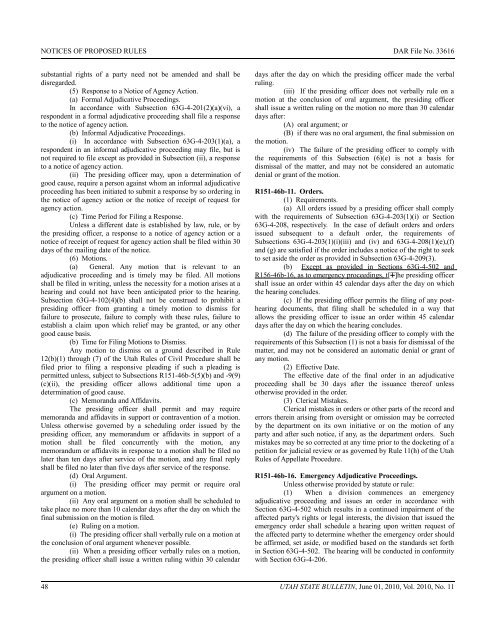
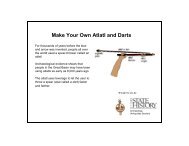
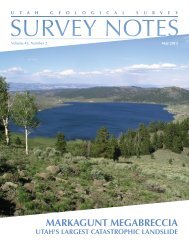
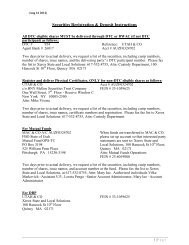
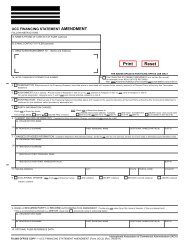
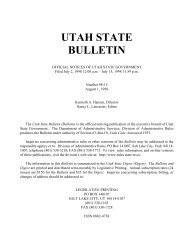
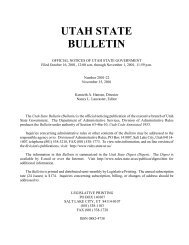

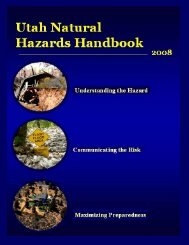
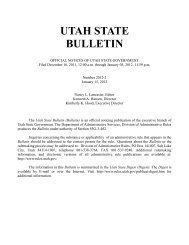
![Lynx avoidance [PDF] - Wisconsin Department of Natural Resources](https://img.yumpu.com/41279089/1/159x260/lynx-avoidance-pdf-wisconsin-department-of-natural-resources.jpg?quality=85)
